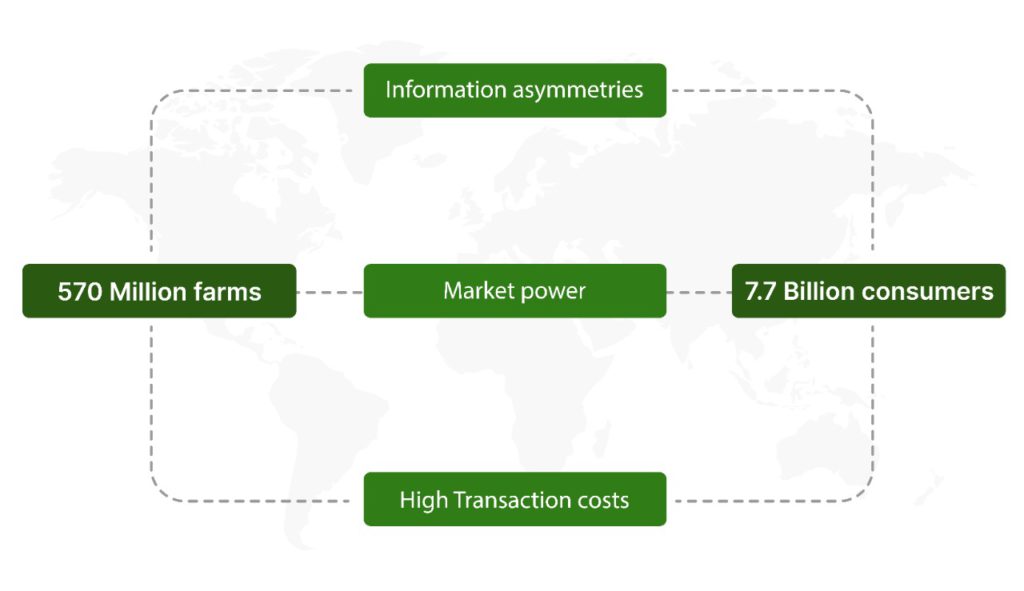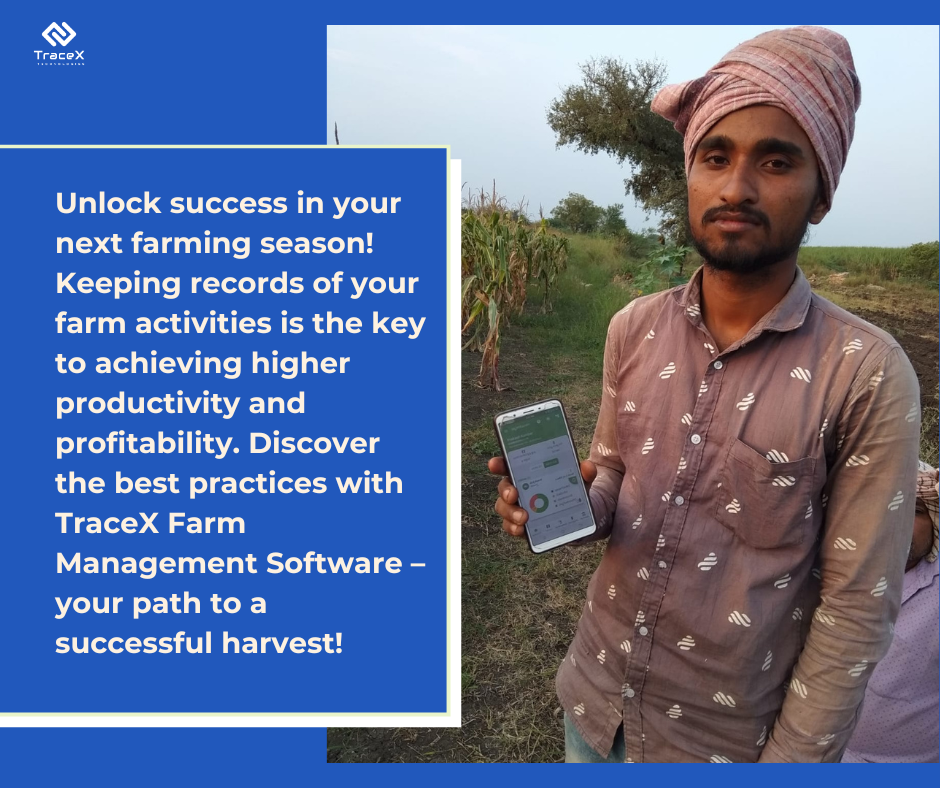Contact: +91 99725 24322 |
Menu
Menu
Quick summary: Explore the top-notch farm management practices that can elevate your agricultural operations. Discover innovative strategies, technological solutions, and sustainable approaches to optimize your farm's productivity. Learn the best practices for efficient crop management, resource utilization, and overall agribusiness success. Dive into our blog for a comprehensive guide on enhancing your farm management skills.

Farmers face a tough challenge today -how do you produce enough to meet the growing food demand while keeping our planet healthy? The pressure to boost yields often leads to practices that can harm the soil, water, and biodiversity. But what if there was a way to strike a balance? Farm management practices offer a path forward, ensuring productivity without sacrificing the environment.
According to WRI, there will be nearly 10 billion people on Earth by 2050—about 3 billion more mouths to feed than there were in 2010.
Given the rate at which the population is growing, limited resources must be used effectively and sustainably to meet human and other food demands. Let’s explore six best practices that can help farmers grow smarter, not harder, while protecting our future.
Key Takeaways
It is a management strategy for organizing and implementing agricultural decisions, such as those involving livestock, crops, aquaculture, agroforestry, etc., to maximize output and profitability. It allocates resources, develops strategies, and plans operations to ensure profitable, sustainable, and productive farming.
“Farm management is concerned with the organization of resources, with planning their use, both within and between enterprises, and with the control of plans both during their implementation and afterwards”
Farm Management can be exhaustive and expensive. The rising demand for food production to feed the growing population has increased the pressure among growers. Implementation of smart farm management strategies should optimize productivity and drive maximum profits for agri-businesses.
Farm management provides the perfect system where in all activities of farming are well organized along with its optimum utilization of resources for bigger profits and less cost.
Traditionally, farmers have leaned on personal experience, local wisdom, and occasional expert consultations to guide decisions. However, navigating modern challenges like stringent regulations, labor shortages, and climate change requires more than traditional knowledge. While some farmers use digital tools, many still rely on manual record-keeping and lack efficient planning and monitoring capabilities. The solution? A centralized digital platform empowering farmer to manage all aspects of their operations efficiently, providing real-time insights for a streamlined production process
Crop production refers to the crop grown for both human consumption and commercial use, and hence crop management refers to all those processes that help grow a better crop. Every input a farmer makes, such as soil, seed, manure, fertilizer, water, harvesting, and storage, can be optimized.
A few of its practices are:
Today, there is a rapid increase in demand for food in the global market, which has created issues of safety, quality and increased wastage. In such conditions, agricultural enterprises are forced to innovate and improve their efficiency. By using a consistent crop and soil management system, the farm’s agricultural production system will become more robust, and crop yields will be more sustainably produced. Thus crop production and management systems will help agriculture to be profitable along with managing the input costs.

Several best practices are essential for achieving efficient farm management. Let’s explore these practices in detail:
Precision farming is like giving your crops a personalized care plan. By using technology such as GPS, drones, and soil sensors, farmers can gather data about their fields and make informed decisions. This means you can apply the right amount of water, fertilizers, and pesticides exactly where they’re needed, optimizing resource usage and boosting crop yields. Imagine knowing precisely when and where to water your plants—this not only helps in growing healthier crops but also saves money and reduces waste!
Sustainable agriculture is all about working in harmony with nature. This practice involves using eco-friendly methods that minimize environmental impact, such as rotating crops, planting cover crops, and reducing chemical inputs. By nurturing the soil and promoting biodiversity, sustainable farming can lead to healthier ecosystems. Plus, it ensures that future generations can also enjoy the land and its resources. Think of it as being a good steward of the earth while still producing the food we all need.
IPM is a smart approach to dealing with pests that focuses on prevention first, rather than just relying on chemical pesticides. This strategy includes monitoring pest populations, using beneficial insects, and implementing cultural practices that deter pests naturally. For example, planting pest-resistant crop varieties or introducing ladybugs to eat harmful aphids can help manage pests effectively. By reducing the use of harmful chemicals, IPM not only protects your crops but also safeguards the environment and your health.
N+3F successfully addressed their challenges and promoted pesticide-free sustainable agriculture by implementing TraceX’s traceability solutions. This integration allowed them to efficiently manage crop growth and harvests while digitizing their operations for streamlined processes. They conducted quality checks to ensure food safety and collaborate effectively with stakeholders, fostering trust within the food system.
Water is a precious resource, especially in farming. Efficient water management involves using smart irrigation techniques, such as drip irrigation or scheduling irrigation based on weather forecasts, to conserve water and reduce wastage. This not only helps ensure your crops receive the right amount of water but also cuts down on costs. Think of it as being water-wise, where every drop counts, especially during dry seasons.
In today’s market, transparency is key. Effective supply chain management ensures that every step from farm to fork is traceable. This means knowing where your products come from, how they are produced, and who is involved in the process. By improving traceability, farmers can build trust with consumers who are increasingly concerned about sustainability and ethical sourcing. Plus, it helps identify inefficiencies and reduces food waste, ensuring that more of what is grown actually makes it to the table.
Healthy soil is the foundation of successful farming. Soil health management involves practices such as adding organic matter (like compost or manure), reducing tillage, and planting cover crops to enhance soil fertility and structure. By focusing on soil health, farmers can improve water retention, promote beneficial microorganisms, and increase nutrient availability for plants. Think of it as giving your crops a nutritious meal that helps them thrive, leading to better yields and more resilient farming systems.
By incorporating these best practices into your scope of farm management strategy, you can contribute to a more sustainable and productive agricultural future. Not only do these practices help the environment, but they also make good business sense, ensuring that farms can thrive for generations to come!
Technology solutions have become the bedrock of modern farm management. From precision farming and IoT-enabled sensors to data analytics and blockchain traceability, these innovations empower farmers with real-time insights, optimizing crop yields, resource utilization, and sustainability. Unlock the potential of smart agriculture, streamline operations, and cultivate a more resilient, tech-driven future for the farming community. Farm management software is a game-changer for sustainable agriculture, providing farmers with the tools they need to optimize their operations while minimizing environmental impact. These platforms offer features such as precision farming, resource management, and data analytics, allowing farmers to make informed decisions about crop planning, irrigation, and pest control.

The TraceX Farm Management Platform is an innovative solution designed to enhance agricultural efficiency and sustainability. It integrates advanced technology to provide farmers with real-time data and insights into their operations. Key features include precision farming tools, which help optimize resource usage; digital record-keeping for streamlined processes; and robust analytics for monitoring crop performance and sustainability metrics.
By leveraging the TraceX platform, farmers can improve decision-making, manage inputs more effectively, and track the entire supply chain for traceability. This not only boosts productivity but also aligns with sustainable agriculture practices, helping to reduce environmental impact and promote food safety. Ultimately, TraceX empowers farmers to achieve their goals of efficiency, transparency, and sustainability in their farming operations.
Implementing best farm management practices is essential for achieving sustainable agriculture. By embracing precision farming, sustainable agriculture techniques, integrated pest management, efficient water management, supply chain management, and soil health improvement, farmers can optimize their operations while minimizing their environmental impact. These practices not only lead to enhanced productivity and profitability but also contribute to a healthier planet. As we move toward a more sustainable future, it’s crucial for farmers to adopt these practices and continuously innovate for the benefit of our ecosystems and communities.
Precision farming uses technology to monitor and manage field variability, ensuring that resources like water, fertilizer, and pesticides are used efficiently. This approach reduces waste and minimizes environmental impact, contributing to more sustainable farming practices.
IPM focuses on managing pest populations using a combination of biological, cultural, and chemical strategies that minimize the use of harmful pesticides. This approach not only protects the environment but also enhances biodiversity and promotes healthier ecosystems.
Farmers can improve soil health by adopting practices such as cover cropping, crop rotation, and reduced tillage. These methods enhance soil structure, increase organic matter, and promote beneficial microorganisms, leading to healthier crops and more resilient agricultural systems.
